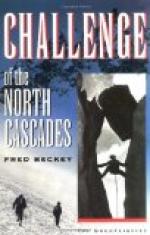“The second summer brought Fred Orcutt, an’ I practically give him the best lot of the whole outfit to build his bank on. The town outgrew the wooden store an’ I built this one, addin’ the annex later, an’ I ripped out the old dam an’ put in a concrete dam an’ a power plant that furnished light an’ power for all Terrace City. Money was comin’ in fast an’ I invested it here an’ there—Michigan, an’ Minnesota, an’ Winconsin pine, an’ the Lord knows what not. Then come the panic, an’ I found out almost over night that I was land poor. I needed cash, or credit at the bank, or I had to take a big loss. I went to see Fred Orcutt—I banked with him, those days, an’ he knew the fix I was in. Yes, the bank would be glad to accommodate me all right; if you could of been there an’ heard Fred Orcutt lay down his terms you’d know just how damn glad they’d of been to accommodate me. It kind of stunned me at first, an’ then I saw red—the man I’d befriended in more ways than one, just layin’ back till he had me in his clutches! Well, I lit out an’ told him just what I thought of him—an’ he got it in log camp English. It never fazed him. He just sat there leanin’ back in his chair, bringin’ the points of his fingers together an’ drawin’ ’em apart again, an’ lookin’ me square in the face with them pale blue fishy eyes of his. When I’d used up all the oaths an’ epithets in common use, an’ some new ones, an’ had to quit, he says, in the same cold, even voice that he’d used in layin’ down his terms, he says, ’You’re a little excited now, John, and I’ll not hold it against you. Just drop in sometime to-morrow or next day and we’ll fix up the papers.’”
“I walked out of the bank with a wild scheme in my head of going to Detroit or Chicago for the money. But I knew it was no use—and so did Orcutt. He thought he had me right where he wanted me—an’ so did I. Meanwhile, an’ about six months previous, a young fellow named Charlie Bronson—president of the First National now—had opened up a little seven-by-nine bank in a tin-covered wooden shack that I’d passed a dozen times a day an’ hadn’t even looked into. I’d met Bronson once or twice, but hadn’t paid no attention to him, an’ as I was headin’ back for the store, he stood in his doorway. ‘Good mornin’ Mr. McNabb,’ he says. I don’t think I’d of took the trouble to answer him, but just then his bank sign caught my eye. It was painted in black letters an’ stuck out over the sidewalk. I stopped an’ looked past him through the open door where his bookkeeper-payin’-an’-receivin’-teller-cashier, an’ general factotum was busy behind the cheap grill. Then I looked at Bronson an’ the only thing I noticed was that his eyes was brown, an’ he was smilin’. ‘Young man,’ I says, ’have you got any money in that sardine can?’
“‘Quite a lot,’ he answers with a grin. ‘More than I wish I had.’
“‘You got a hundred thousand?’ I asks—it was more than I needed, but I thought I’d make it big enough to scare him.




